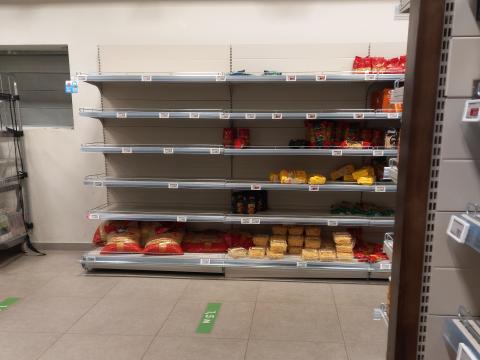What Could Go Wrong When Governments Take Control of Food? We're About to Find Out.

Daisy Luther
In another episode of "Have We Learned Nothing from History?" two governments in the past couple of days have decided to take the high prices of food into their own hands.
Justin Trudeau, the Prime Minister of Canada, wants to heap more taxes on grocery stores to punish them for high prices. And Chicago's mayor, Brandon Johnson, has proposed city-owned grocery stores.
Some other times the government has taken control of the food supply
Historically, it's the beginning of the end for people when the government begins to interfere with food pricing, production, and distribution. Just look at some of the rules that were established in Venezuela that led to widespread hunger. The government took control of food production facilities. They began forcing farmers to produce food for less than the cost of growing or raising it. They rationed food to families. They even began to track people who were growing their own food. In short, every terrible decision it was possible to make, they made. And the people suffered for it.
There's an article by a friend of mine, Scott Terry, that I always cite when talking about the collectivization of food. He wrote a concerning history of this troubling phenomenon right here in America and it's well worth a read. His article is specifically about agriculture but the same principles hold true of other governmental controls on food.
In short, he concludes that:
There are several reasons why the collectivists want to destroy agriculture in America.
The first being that the farmer has traditionally been the great stumbling block to communism and totalitarianism. Stalin found this out the hard way and had to murder seven million ( 7,000,000) Ukrainian farmers by starvation. One cannot enslave a population of independent freeholders. They must be removed one way or another.
The second reason is that the easiest way to control people is through food. There are executive orders on the books that give the federal government the power to confiscate and nationalize the nations agricultural resources. Now, it is much easier to control a handful of farms as opposed to controlling several million farms. These plans have been on the books for many years (and always renewed by all subsequent presidents) and help explain why the USDA has always encouraged farmers to "get big or get out". No industry in America has seen more consolidation than agriculture.
Stalin starved as many as 7 million Ukrainians during the Holomodor. China's Great Famine was the result of governmental decisions and 30 million people died of starvation. Ethiopia has been accused of deliberately starving its own citizens. North Korea has such stringent rules around who can have food and what they can have that people starve to death in the middle of wheat fields because their harvests go to the government.
In short, it's always ALWAYS a terrible idea.
What does Justin Trudeau want to do?
The heads of Canada's largest grocery store chains were hastily summoned to the capitol in Ottawa to discuss plans to "stabilize food prices" after PM Trudeau issued an ultimatum:
The meeting was the result of Prime Minister Justin Trudeau declaring on Friday that he was summonsing top officials from Loblaw, Metro, Empire, Walmart and Costco to begin discussions to address what a House committee has long been studying(opens in a new tab): the escalating price of groceries in Canada.
Trudeau's ultimatum was(opens in a new tab): Come up with a credible plan by Thanksgiving or he'll consider "the use of tax measures in order to restore the grocery price stability that Canadians expect."



























